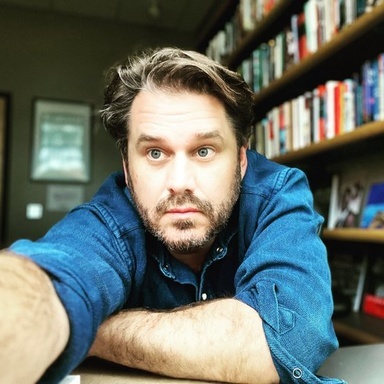By Fatima Salinas
Dean Bakopoulos, an associate professor in the Department of Cinematic Arts in the College of Liberal Arts and Sciences, began his career as a novelist who then became interested in adapting his works for the big screen.
Bakopoulos currently teaches “Topics in Screenwriting,” which focuses on specialized subjects related to the art, craft, history, and business of screenwriting for film, television, and new media platforms. The course is typically offered every semester and gives preference to cinematic arts and screen writing majors.
“By the end of the semester, every student will have crafted a draft of an original television pilot,” Bakopoulos said. “For emerging writers, a good ‘sample’ script can help them make connections with industry professionals like managers, artists, and producers.”
Bakopoulos is also working on developing an introductory course in TV writing for non-majors.

“I love talking about the creative process with students who are just discovering what it means to be an artist,” Bakopoulos said. “Art and making art are a hugely important part of my spiritual life and my writing rituals are really essential to my well-being.”
Bakopoulos is the author of the novels Please Don't Come Back from the Moon, My American Unhappiness, and Summerlong. A Writers Guild of America screenwriter, he co-wrote the film adaptation of his first novel and is co-creator and executive producer of the HBO MAX series Made for Love.
His first feature film, Don’t Come Back from the Moon, was a New York Times’ Critics Pick directed by Bruce Thierry Cheung and starring Rashida Jones. Bakopoulos is currently developing several original projects for television at major studios and production companies, including an adaptation of his short story, "The Dog." Bakopoulos also co-created a new television series that will eventually air on Apple TV+; details for the production are still under wraps, though they'll be announced this spring.
“I have worked full-time as a writer at various points in my life, and I usually start to get a little strange and very anxious,” Bakopoulos said. “I really enjoy mentoring other writers—it works well with my extroverted nature. I also love helping people solve problems—I love reading a great idea for a script and helping students make their scripts even better.”
As a faculty member and head of screenwriting, he focuses on character development, discussing how every great TV series features a protagonist who wants liberation from something so badly that they will risk destruction to get it.
“If you know what your characters want liberation from, and you know what destruction might look like for them, you can usually build a great story and world around that simple idea,” Bakopoulos said.
Delaney Waterman, a fourth-year cinema and theater double major with a minor in communications has taken her fair share of writing courses as a CLAS student. She wanted to take a class focused on episodic storytelling.
“Dean Bakopoulos has worked in the industry and knows what the entire process is like to get a television show off the ground,” Waterman said. “From the conception of the idea to pitching it to producers and production companies to working in a writer's room, he was very knowledgeable and helped me understand what it was like to work as a television writer in the industry.”
Waterman is hoping to shoot the television pilot she wrote in Bakopoulos’s class.
Connor French, a fourth-year cinema and screenwriting arts double major decided to take the course because he hadn’t yet gotten to take a screenwriting course at Iowa that was focused specifically on television writing, something he had been interested in since he started the major.
French liked that Bakopolous led the workshop sessions as if their class was a production studio, which not only led to the best peer feedback he’s ever received from a class, but also to the students learning how to build a community and give others meaningful and applicable critiques.
“Writing is difficult, but teaching someone to write is even harder, and Dean knows how to teach,” French said. “Every time I had a conversation with him, whether in workshop with the class or office hours, I came away with inspiration and ideas for continuing my pilot.”